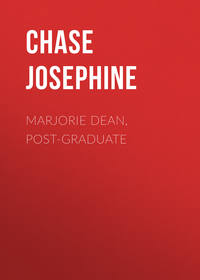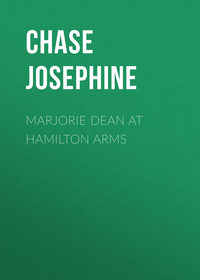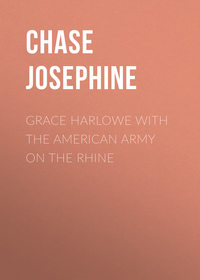 полная версия
полная версияMarjorie Dean, High School Senior
“You needn’t count on me to stand by you, Mignon, if you keep up your back-biting about Veronica,” flashed Jerry. She had reached the limit of silence. “I’d have asked you to resign before this if it hadn’t been for Marjorie. You make me tired. Why can’t you let well enough alone? You’re an officer in the Lookouts. If you behave yourself you can shine in the revue. You’ll gain more by keeping your opinions of Veronica to yourself.”
Astonishment at this blunt advice tied Mignon’s tongue for an instant. Secretly she had always been afraid of plain-spoken Jerry Macy. The stout girl had the disconcerting faculty of coming to the point with a vengeance. Her arguments were too clinching to be easily refuted. Marjorie’s earnest speech had had small effect upon Mignon. Jerry had outlined her shaky position in a few brusque words, the truth of which struck home.
Having met her match, Mignon resorted to the world-old feminine artifice. Flinging herself down on a brocade settee she burst into tears. They were not tears of remorse; merely an outward expression of baffled rage. Justly accused, she was overcome by the knowledge of her own inability to clear herself.
Jerry eyed her with patent disgust. “Crocodile tears,” was her uncharitable thought. Marjorie, on the contrary, was moved to pity. Rising, she crossed the room to where Mignon sat huddled on the settee, her face hidden in her hands. Laying a gentle hand on the bowed shoulders, Marjorie said soothingly: “Don’t cry, Mignon. Please try to think of Jerry and me as your friends. We have your interests at heart as well as Veronica’s. I am sure that if you will try to know her, you will find her a delightful girl. No one knows that Jerry and I intended to speak to you about her. No one will ever know. All I am asking you to do is to give both yourself and Veronica a fair chance.”
Mignon answered only with a fresh burst of sobs. This time they were not genuine. Under pretence of weeping, her active mind was already at work, endeavoring to decide what she had best do. To resign from the club would profit her nothing. Once out of it, she would not only miss all the good times in prospect, but also find herself completely out of touch with the members. Far from accepting Marjorie’s rebuke in the spirit in which it had been offered, she now yearned for revenge upon this priggish, goody-goody who had dared to remind her of her shortcomings. Yet how could she retaliate if she deliberately cut herself off from her intended victim? Taking a leaf from Rowena’s book she resolved to bring craft to her aid. She would pretend to fall in with Marjorie’s scheme of conduct. Afterward —
Raising her head with a jerk she said with well-simulated meekness: “I believe you are right, Marjorie. Please give me another chance to show you that I can be a true Lookout.” With an air of deep penitence she held out her hand to Marjorie.
“I am glad you can say that, Mignon.” Marjorie’s hand went out instantly. “Now let us forget all about the disagreeable part. It has been hard for all of us. There is just one thing more I’d like to say. If after you have tried to like Veronica you find that you can’t, then no one will be to blame. We cannot expect others always to see our friends as we see them. You have a perfect right to like or dislike anyone you please. All I ask is – ”
“I will try to like her for your sake, Marjorie,” Mignon interrupted with deceitful sweetness. Immediately changing the subject, she began to regale Marjorie with an account of a near accident she had had that day while driving her runabout.
“I think we’d better go,” Jerry announced sharply. She had had quite enough of Mignon and was not impressed by the erring one’s miraculous repentance. She doubted its sincerity, and she could hardly refrain from saying so. She had sat silent and uncompromising during the scene, making no move toward offering a rehabilitating hand. Mignon’s swift change of the subject disgusted her even more. She understood the reason for it if Marjorie did not.
Mignon sent a covert glance toward this stony-faced third party whom she feared. She knew that Jerry was quite out of sympathy with her. She longed to say something particularly cutting to the stout girl but caution warned her to silence.
“Yes, we must go.” Marjorie still stood beside the settee that held Mignon. Now she turned to the latter who had made no move to rise and again held out her hand. “Good night, Mignon,” she said. “Don’t forget the club meeting to-morrow evening.”
Reluctantly Mignon rose to perform the parting civilities which courtesy demanded.
“Good night, Mignon.” Jerry was already half way to the door when she spoke.
“Good night.” Mignon cast a spiteful look toward the stout girl. Following her callers into the hall, she saw them to the door with little enthusiasm. She was longing for them to go and could scarcely forbear slamming the unoffending portal in their faces. Closing it behind them with spiteful force, she clenched her hands in an excess of passionate fury. “Idiots!” she raged. “How dared they come here and humiliate me? They’ll be sorry! Just wait!”
Half way down the walk the reform committee heard the slam of the door.
“Hear that?” asked Jerry savagely. “That’s the real Mignon. Look out for her. You made a mistake when you said what you did about her being free to like or dislike Ronny. You gave her a chance to hit back.”
“But I said afterward that all I asked of her was – ” Marjorie stopped. “Why, Jerry, I didn’t say the most important part of my sentence. Mignon interrupted me. Then she began talking about her runabout and I didn’t finish it. I thought she changed the subject because she was dreadfully embarrassed.”
“Of course, she interrupted you.” Jerry grew increasingly scornful. “She knew you’d said just enough to be useful to her. She hasn’t any intention of trying to like Ronny. She’ll treat her just the same as ever. If you say anything about it to her again, she will laugh and quote your own words to you. We might better have stayed at home for all the good we’ve done.”
“Don’t borrow trouble, Jeremiah.” Marjorie linked an affectionate arm in Jerry’s. “I think we’ve done a little good to-night. Mignon will be careful what she says or does for a while. She doesn’t care to resign from the club, else she would have said so to-night. She wants to be in the revue, too. Telling her what Laurie said sounded rather like threatening her, but I had to do it.”
“There is no cure for Mignon,” stated Jerry shortly, “and this is the last time I’ll help play doctor. There’s just one consolation, though. Give her enough rope and she’ll hang herself.”
CHAPTER XV – THE FULFILLMENT OF THE PLAN
The Lookouts met the next evening at Muriel Harding’s home, and the Campfire project was received with acclamation. Nearly everyone present had a suggestion to tender that would go toward making the affair a success. The decision regarding the number of booths and what each should offer for sale had been left to the Lookouts. After much discussion they agreed upon a number of attractions which were calculated to meet the approval of the residents of Sanford. Not wishing to solicit donations from those on whose attendance they counted, it was difficult to plan features that would yield the largest profit for the smallest outlay of money. Unsolicited donations would be thankfully received. As a matter of fact the mothers and fathers of the members had already offered their help.
One booth would be devoted to the sale of homemade candy, which the mothers of the Lookouts had agreed to contribute. Another would offer hand-painted postcards, pledged by the artistic element of the club. There was also to be a gypsy fortune-teller, a fish pond, a lemonade stand, an ice cream and cake booth, fruit and flower booth, a huge pumpkin on which guesses were to be sold regarding the exact number of seeds it contained, and various other artful attractions which would cost little and yield much profit. It was also deemed advisable to ask the members of the senior class to help at the various booths.
The Sanford Guards had held a meeting on the preceding evening and Hal had informed Jerry of their willingness to take half of the work of preparation on their shoulders. Besides Laurie’s revue, they would offer a funny side show, a shooting gallery, a patriotic booth, as well as furnishing nightly an exhibition of military maneuvers. Jerry duly reported this to the Lookouts, who were well-satisfied. Thanksgiving fell on the twenty-seventh of November. As it was the evening of the fourth on which the meeting was held, the need for swift action became imminent.
“We’ll have to hustle if we are going to do all we’ve planned to do in the next three weeks,” was Jerry’s unofficial reminder. “We have to go to school, you know, and we can’t neglect the day nursery. We’ll have to buy some of the postcards. You girls can never turn out enough in three weeks to supply the demand. The candy and cakes our mothers will take care of, thank goodness. Still, we ought to buy a certain amount of boxed candy. The boys will see to the tents and the counters and such things. Hal says that the military tents the Guards use aren’t large enough. Most of the boys have larger ones of their own that they use to go camping. They will be best for booths. It’s a good thing the Armory is such a whale – I mean, such a large place.”
“We can’t afford to waste a minute,” nodded Muriel Harding. “It’s a good thing, too, that we are out of basket ball this year. I am glad of it. Last year killed my ambition to play.”
“Miss Davis is having her own troubles in making up the teams,” informed Daisy Griggs. “The sophs who played on Rowena Farnham’s team last year all refused to try for the junior team. Nellie Simmons told a girl that she wouldn’t play basket ball again for a hundred dollars. I guess the scolding Miss Archer gave them last year was a little too much for them.”
“I am very sorry there is no senior team,” declared Mignon with a defiant toss of her head. “Basket ball is about the only thing worth while in Sanford High. I think it is very sweet in Miss Davis to try so hard to keep it alive after what she had to endure last year.”
“Whatever she had to stand from the players was her own fault,” flashed Susan Atwell heatedly. “If she hadn’t – Oh, I forgot – I’m a Lookout.” Susan subsided with a blush and a giggle.
Mignon’s black eyes gleamed. Others beside herself, it seemed, could gossip. Daisy Griggs and Susan Atwell were both guilty of back-biting. Realizing her advantage she promptly seized it. “It is because I am a Lookout that I am defending Miss Davis. It is hardly fair, I think, to gossip about her behind her back.”
“I’d just as soon say it to her face,” sputtered Susan.
“Suppose we drop the subject of basket ball,” suggested Jerry significantly. “We have other things more important to discuss.”
Mignon opened her lips as though about to make hot reply. Reconsidering, she contented herself with an inimitable shrug that spoke volumes. For once she had scored. She would treasure the knowledge against a time of need. Supremely satisfied with herself, she entered into the further discussion of the Campfire with deceitful amiability. Only one person utterly refuted it. Jerry Macy was not to be deceived for a moment. Unknown to Marjorie, she had determined to constitute herself a vigilance committee of one to keep tab on Mignon. She was entirely through with Mignon and she vengefully hoped that the figurative hanging she had prophesied would soon take place.
The next three weeks found the Lookouts engaged in a whirl of day nursery, Campfire and school. Naturally the Campfire movement predominated their interest. Had they undertaken it alone, they could never have carried it to completion in so short a period of time. The Guards, headed by Laurie, Hal and Danny Seabrooke, proved able coadjutors, and the project took definite shape with a rush.
The Campfire was scheduled to open on Thanksgiving evening, and the excited promoters of it hurried through with their Thanksgiving dinners in order to spend the afternoon in putting the final touches to its various attractions. In a small city like Sanford, advertising the affair had been a simple matter. For two weeks beforehand it had been the main topic of conversation in the two high schools. Gay posters announcing it were prominently placed in several of the largest stores. Typed notices ornamented the locker rooms in both high schools, the pupils of which straightway constituted themselves as ardent news-carriers. This in itself was an infallible method of advertising.
As for the big Armory, it hardly knew itself. A festive collection of tents opened in front to their widest extent, lined three sides of it. At the upper end, at the right of the platform, a palm-screened enclosure had been arranged to hold the Sanford orchestra. Despite the amount of room the booths took up, the space enclosed by them was large. During the early part of the evening it would be used for the military maneuvers. These over it would be turned into a dancing floor. An admission fee of thirty-five cents would be levied at the door, and the spectators would view the entertainment provided from the gallery which extended around three sides of the drill floor.
The Lookouts, in their prettiest evening frocks, assisted by their senior sisters, were to preside over the booths the club had fitted out as their part of the undertaking. The Guards were to look after their own special contributions and act as ushers and program distributors. Colonel Dearborn, a United States Army veteran, the only Sanford survivor of the Civil War, would open the Campfire with a speech of welcome. Captain Baynes, the drill master of the Sanford Guards, was also down for a speech. The latter had received injuries in the Spanish-American war which incapacitated him for further active service in the army. His enthusiasm unquenched, he had organized the Sanford Guards and devoted himself assiduously to their training. He was greatly liked and respected by the Weston High School lads, who had vigorously pleaded for a few words from him to complete the opening ceremonies. Miss Archer had been unanimously chosen by the Lookouts as their representative speaker.
Owing to lack of time, Laurie’s revue would begin at eight o’clock, and last an hour. Constance and Mignon were down on the program for songs. Veronica was to dance, Danny Seabrooke was to demonstrate his agility in a comic juggling act. Laurie and Hal were to display themselves as scientific handlers of fencing foils, while the Crane was to do a funny eccentric dance which he could perform to perfection. Muriel, Susan, Rita Talbot and three Weston High School boys were to contribute a pretty singing and dancing number. Greatly to his discomfiture, Laurie had received numerous requests to play on his violin, and had reluctantly consented to render a solo as the concluding number of the revue. The Weston High Glee Club were to open the performance. The revue was to be followed by ten minutes of military maneuvers, a different drill to be given each night. Then the spectators were to be cordially invited to descend and spend their money.
“I can almost believe I’m a real soldier,” Marjorie confided to Constance, when at half past seven o’clock Thanksgiving evening the two girls stepped into the patriotically decorated Armory which presented a gay and busy aspect. Wherever her eyes chanced to rest she saw the khaki-clad figures of the Guards, their uniforms patterned after those of the regular United States Army.
“It’s inspiring, isn’t it?” Constance, looking very lovely in her pale blue and silver frock, gazed eagerly about her. Standing beside Marjorie, who was wearing her peachblow gown, the two young girls made a pretty picture, as more than one gallant guardsman was ready to testify.
“I do hope everything will go beautifully.” Marjorie clasped her hands fervently. “I have made up my mind that our booth must sell every single box of candy. Irma is sweet among the flowers, isn’t she? The flower booth just suits her. All the girls look lovely. Lucy Warner is a dear in that soft, white gown. She’s a good person to have in the postcards.”
“Now what are you two talking about?” Unobserved, Jerry Macy had stolen up behind them.
“Oh, hello, Jeremiah! How nice you look!” Marjorie reached out to pat Jerry’s plump shoulder. “That white net gown is so becoming.”
“It’ll do,” conceded Jerry gruffly. According to her own statement, praise always made her “feel foolish.” “You and Connie are pretty likely to drag down a few bouquets,” she generously added.
“We’ll do.” Constance mischievously mimicked Jerry.
“Now that we’ve changed compliments, I’ll throw a few bouquets at the shrine of the Lookouts,” grinned Jerry. “We certainly deserve a lot of credit, and we owe a loud vote of thanks to our fathers and mothers. If it hadn’t been for them we wouldn’t have half the stuff for the booths that’s in them now. When this thing is over, the Lookouts must send personal letters of thanks to all who’ve helped us.”
“We surely must,” chorused Marjorie and Constance.
The Lookouts were indeed indebted to their elders. Mr. Macy, Mr. La Salle and Miss Allison had been especially liberal with monetary gifts, while the fathers of the members in less affluent circumstances had each “done their bit.” The mothers, too, had become loyal candy and cake makers, not to mention the many other services they had rendered ungrudgingly. Anxious to encourage their children to the performance of worthy work, these broad-minded men and women believed it to be their duty to assist the young enthusiasts in every possible way.
“I’m glad we gave Mignon that lemonade job,” commented Jerry, her round eyes wandering to where the big punch bowl stood, thus far minus the French girl’s presence. “She’ll be off by herself where she can’t stir up trouble. She’ll have to stay there, too, when the revue’s over. I calculated on that when I asked her to take charge of the lemonade bowl. She doesn’t know that she’s going to be off in a corner away from the rest of the girls. I didn’t tell her. Maybe she’ll be mad when she finds out. I can’t help it. I hope she will get here on time. It’s just like her to come straggling in late so everyone will see her.”
“Jerry, you are breaking the Golden Rule,” reminded Marjorie.
“Oh, I’m only bending it,” retorted Jerry good-humoredly. “Besides, you two girls don’t count. I must say whatever I think to you. To others I am a clammy clam. Hello! There she comes now. I must say she looks like a lemon in that yellow frock. It’s the exact color of one.”
“She is really stunning!” Marjorie exclaimed generously. “That pale yellow chiffon frock is quite suited to her. It brings out her black eyes and hair.”
“Handsome is as handsome does,” Jerry made skeptical response. “I must leave you now to break the sad news to her. If, in about three minutes, you see her looking like a thundercloud you’ll know the reason.”
Jerry sauntered away to deliver the fateful information to Mignon. The eyes of the two friends meeting, Marjorie made a gesture of dissent. “I’d rather not watch to see how she takes it. It doesn’t seem quite fair. Jerry didn’t stop to think or she wouldn’t have said that. As I’m not in the revue I had better go to my booth.”
“I must hurry behind the scenes,” said Constance. “It’s ten minutes to eight now and my song comes third on the program.”
With this the two girls separated, Constance heading in the direction of a room at the left of the Armory, nearest to the platform. From it the girl performers made their entrance to the improvised stage. The room on the right had been given over to the boys, Marjorie walked slowly toward the candy booth. When half way to it she heard someone call her name. Glancing in the direction of the post card booth, she saw Lucy Warner beckoning eagerly to her. A happy light radiated from the girl’s usually austere features. Her bluish-green eyes sparkled with pleasure. Lucy was childishly delighted to have the opportunity to assist in so important an affair as the Campfire. She felt that she owed this happiness directly to Marjorie.
“Oh, Marjorie!” she exclaimed, as her friend reached the booth. “It’s wonderful! I can’t really believe that this good time has come to me! And I have you to thank for it all! I hope some day to be able to show you how much I appreciate your friendship.”
“I’m ever so glad to see you so bright and happy, Lucy,” Marjorie made earnest response. “You must thank yourself for your good time, though. You are a faithful Lookout. This is only the beginning. There are lots of good times ahead of you.”
Before Lucy could reply, Hal Macy appeared at Marjorie’s elbow with, “Veronica’s here. She’s in the girls’ dressing room. She wants to see you.”
“I’ll come back later, Lucy.” With a friendly nod, Marjorie turned to accompany Hal across the polished floor. A happy smile played about her lips. Whatever the Lookouts might eventually set down to their further credit, they had certainly succeeded in bringing happiness to Lucy Warner.
CHAPTER XVI – A PUZZLING YOUNG PERSON
“Veronica Browning!” Marjorie cried out admiringly. “You magnificent person. Where, oh where, did you get that wonderful, I won’t say gown, I’ll say robe? Certainly you never walked through the streets of Sanford in that.”
“Oh, no, I ordered a – ” Veronica checked herself, looking vexed. “Miss Archer insisted that I should come in a taxicab,” she explained shortly.
“It’s a marvelous robe.” Noting Veronica’s abrupt chopping off of her first sentence, and the frown that accompanied it, Marjorie hastily returned to the exquisite garment Veronica was wearing. It was of soft, dead black crêpe de chine, and fell away from her dazzlingly white throat and shoulders in long, graceful lines. Very full, it swept the floor ending in a border of stars and crescent moons, outlined in dull silver. The ample sleeves, edged in the same silver design, dropped away from her round white arms, giving a wing-like effect. Over her golden brown hair was banded a fillet of silver. A quaintly-wrought pendant in the form of a crescent depended from it and lay directly on the center of her forehead.
“You look like – let me see – a painting of ‘Night’ that I once saw!” cried Marjorie, triumphantly recalling it in time to make the comparison. “But what are you going to do with those black and orange wings?” Marjorie was intently eyeing a small pair of black and orange wings that dangled from Veronica’s arm.
“I am the Night, the silvery, shadowy Night,” declaimed Veronica gaily, one white arm raised aloft. “I am going to give you a dance called ‘Night.’ Hence this somber robe. No, the wings don’t belong to Night. Underneath this black pall, I am a glorious black and orange butterfly. I am to do two dances; ‘Butterfly’ will follow ‘Night.’ I can rid myself of this black thing in about one minute or even less. As I come next to you on the program, Connie, I will ask you to wait after your song and fasten on my wings. Here they are.”
“Where did you learn to dance, Veronica?” queried Marjorie thoughtlessly. Instantly she regretted having asked the question. Hastily she added: “That was rather a personal question. Perhaps I shouldn’t – ”
“Oh, I don’t object to telling you, Marjorie.” A faintly amused smile dawned upon Veronica’s lips. “I have known how to dance ever since I was a child. Most of my dances like ‘Night’ and ‘Butterfly’ I made up. The Shadow dance I learned from seeing it done by another person. I used to – ” Again the provoking break in her speech occurred.
Marjorie’s face fell. Why did Veronica always pause in the middle of what promised to be an interesting revelation? What an extremely peculiar girl she was. She could not refrain from wondering, too, at the beautiful robe that this charming but tantalizing young person wore. It must have cost a considerable sum of money. Yet Veronica appeared to regard it with the carelessness of one who was accustomed to the best of everything. Perhaps she had at one time been possessed of wealth and had met with sudden reverses. Still, it was hardly likely that, given such a contingency, she would now be so humbly earning her living and education. Marjorie’s swift cogitations ended in a sigh of defeat at her inability to reconcile lowly Veronica with her handsome dancing dress.









